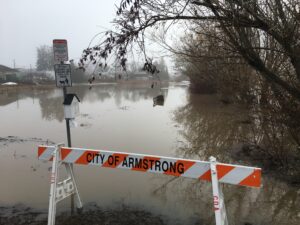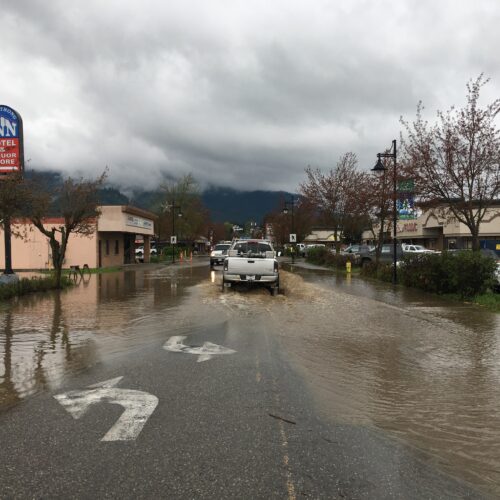Emergency Management
Disasters have been occurring around the globe with unprecedented frequency, bringing to the forefront the need to be prepared for disasters of all kinds. The City of Armstrong believes that the more work we do today, the more we can help the residents and businesses in our community. With preparation, our City can become more resilient to the effects of a disaster and better prepared to cope after a major disaster.
It is important that everyone, from school-aged children to seniors, understand that emergency preparedness is something in which we all play a very important role. Disasters take many forms: floods, winter storms, heatwaves, chemical spills, fires, earthquakes, etc. When disaster does strike, the best protection is knowing what to do.



Introducing
Alertable
The City of Armstrong is now using Alertable to send emergency alerts, fires, floods, severe weather, other hazards and more. We encourage residents and visitors to sign up and use Alertable to stay aware and plan ahead. Check for closures, restrictions and hazards in advance. Keep yourself and others informed and up to date with Alertable.
Alertable will be used to share time-sensitive information and direction related to local emergencies such as wildfires, floods, or other hazards that may occur.
We encourage Residents and visitors to subscribe to Alertable and choose their preferred method for receiving alerts. Signing up for alerts through the smart phone app is recommended because it gives users the option to receive alerts from any jurisdiction that uses the app based on their real-time current location. In addition to the app option, there are over 14 others to choose from, including text, email, phone, website, social media, home smart speaker and more.
Extreme Heat
Extreme heat events (also known as heat waves) involve high temperatures and may be combined with high humidity. These events can has a serious impact on citizens. The City of Armstrong works with Interior Health and the Province to provide residents with important information to avoid serious health-risks.
Heat Event Response Planning
Developing a municipal heat response plan: a guide for medium-sized municipalities
Communicating the Health Risks of Extreme Heat Events
Communicating the Health Risks of Extreme Heat Events
This Toolkit is intended for use by public health and emergency management officials who are developing or updating heat-health communication strategies. Includes public communications materials.



Emergency Management Services in Armstrong
The City of Armstrong provides emergency management services directly to the community, including operational support to first responders (fire, police, ambulance and public works operations) during major incidents. Operational support may include the activation of an Emergency Operations Centre, coordination with emergency support services in partnership with the RDNO and the Canadian Red Cross Society (CRCS), community-wide evacuation procedures, and coordination of resources and agencies involved in response and recovery.
The provincial emergency program, Emergency Management BC (EMBC), is a division of the Ministry of Transportation and Infrastructure, reporting to the Minister of State for Emergency Preparedness. EMBC works with local governments year round, providing training and support before, during and after emergencies.
Public Safety Canada coordinates and supports the efforts of federal organizations, ensuring national security and the safety of Canadians. They also work with other levels of government, first responders, community groups, the private sector and other nations. They provide information to help Canadians prepare for emergencies, including guides, websites and public awareness activities such as Emergency Preparedness Week.
Ways to Stay Informed
One of the most important things you’ll need during an emergency is information. In the case of an emergency, we will provide updates from the City of Armstrong on



Do Your Part
Be Pepared
Preparations such as packing a “Grab & Go” bag can make a big difference in the event of a disaster. If you are on a prescription, don’t forget your medication.
Wildfires
The risk of wildfires throughout the province and our region is seasonal and continues to evolve. The City of Armstrong acts on advice from B.C. Wildfire Service and Emergency Management B.C. Our organization actively engages with these organizations to review wildfire status and statistics.
fLOODING
The City of Armstrong takes steps annually to prepare for the potential of flooding and its effects.
Flood Mapping and Risk Assessment Report
The City developed a Flood Mapping and Risk Assessment Report in 2019. This Flood Mapping and Risk Assessment Report supports and directs the development and implementation of an integrated flood management plan (IFMP) by providing the City with flood mapping, a risk assessment, and other flood risk mitigation information. This report will take a bit to load as it is large.
Additional information about general flood preparedness for homeowners can be found by following the links below:
Volunteer for Emergency Support Services
Emergency Support Services is based on volunteerism and is dependent on the willingness of individuals in the community to help plan for the well-being of their neighbours and fellow citizens in the event of a disaster.
For more information regarding volunteering and the provided services:
Further information can also be found on the Canadian Red Cross website.
Prepared BC has created a short video outlining what Emergency Social Services are.
Emergency Preparation for Pets
If you are forced to leave your home, it is important to remember to take your pet(s) with you. Leaving pets behind, even if you try to make a safe place for them, is not the best option. Unfortunately, most emergency shelters cannot accept pets, except for service animals such as dogs for the visually impaired, so you must plan ahead. Start with relatives or friends outside your area, boarding kennels and vet clinics who could shelter your animals during an emergency. Some motels and campgrounds allow pets too.
Once you have compiled a list remember to put a copy in your “Grab and Go” bag and don’t forget to include your pets supplies (leash, portable kennel, food, and water). If you have advance warning of a possible disaster or severe storm, keep your pets inside with you so you won’t have to look for them if you are forced to leave your home. Make sure your pets are wearing collars and identification tags.
COVID 19 Informaition
The novel coronavirus (COVID-19) pandemic continues to evolve around the world. The City of Armstrong’s top priority is to encourage and maintain the health and safety of citizens, visitors and staff. The City continues to follow directions from the Province of B.C. and the Government of Canada.
About Armstrong
The City of Armstrong is a friendly community with a beautiful trails network, bustling downtown core and peaceful family-friendly atmosphere.
We welcome all those who wish to visit, live, or invest in this peaceful little city. Armstrong considered the “Heart of Country” is located in the heart of Spallumcheen Valley, between the sunny Okanagan and the bright Shuswap Valleys.




